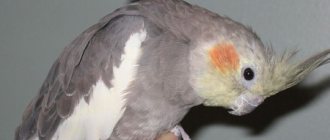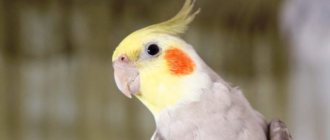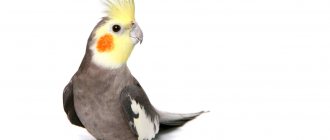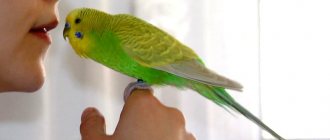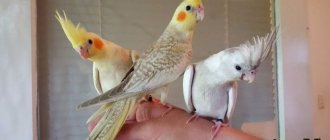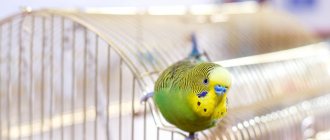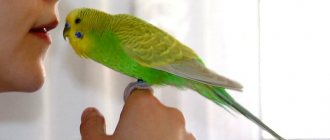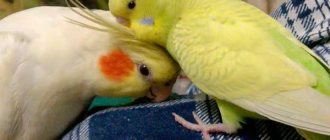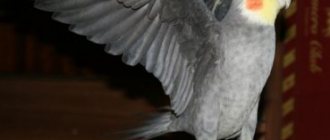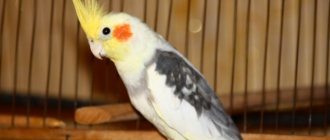Why does the parrot scream
Some birds are especially prone to noise: African Grays, Macaws, Cockatoos. Small parrots, for example, budgerigars, also scream, but for the human ear these sounds are not so sharp. A bird can voice what it feels at the moment. Pets, through a raised tone, let people know that they need something and are worried.
Common causes of screaming:
- the pet has nothing to do, he is bored and lonely;
- living conditions have changed, a move has occurred, or new neighbors have appeared in the cage;
- the bird experiences fear, stress, and is in a state of shock;
- the parrot is hungry, sick and in great discomfort.
Other cases of loud sounds are normal singing, an indicator of a good mood.
The morning calls of parrots are absolutely normal. Even domesticated birds at the genetic level retain the memory of natural biorhythms. Having woken up, the bird sings, clears its throat, and notifies those around it of its awakening. If your client starts screaming in the evenings, he may be overexcited. Birds often meet their owners only before going to bed and express their joy by screaming.
Diseases of the gastrointestinal tract
For diseases associated with the digestive system, the parrot develops the following symptoms:
- vomit;
- diarrhea;
- indigestion;
- blood in excrement;
- stomach ache.
Birds are often diagnosed with gastroenteritis and dysbacteriosis. These cockatiel diseases have similar symptoms and treatments.
Gastroenteritis
Inflammation of the stomach and intestines is one of the most common causes of death in pet parrots. It happens when eating low-quality food: contaminated grain, rotten fruit. The main symptoms of gastroenteritis:
- diarrhea is a protective reaction of the body;
- green discharge mixed with blood;
- regurgitation of undigested food;
- increased thirst;
- complete refusal of food.
If not treated promptly, the cockatiel will die from dehydration. Gastroenteritis is treatable. Therapy is carried out with antibiotics and enterosorbents. The parrot is force-fed through a syringe. Additionally, vitamin injections are given.
Dysbacteriosis
An unpleasant but not fatal disease is dysbacteriosis, a disorder of the intestinal microflora. Appears as a concomitant disorder in cases of poisoning and diseases of the digestive tract. The parrot's mood deteriorates and he defecates frequently and loosely.
Diarrhea in a cockatiel can be eliminated by resorting to treatment with enzyme preparations and sorbents. Diet adjustments are required: juicy fruits, vegetables, and herbs should be avoided. It is necessary to abandon the ready-made dry mixtures used previously. Perhaps they contain components that brought the parrot to this state.
Constipation
Sedentary birds prone to obesity often suffer from stool retention. Lack of succulent food and the predominance of dry grain in the diet contribute to constipation. Difficulty defecating is also common in parrots that have internal parasites. When constipated, the bird feels the urge to have a bowel movement, shakes its tail and squats. To help her, you need to inject a little vegetable oil into the cloaca with a pipette, and 3 drops of castor oil into the beak.
How to deal with screaming
Keeping a noisy bird becomes a real punishment for the owner. Not only family members, but also neighbors suffer from constant noise. If your parrot screams heart-rendingly throughout the day, you need to start raising it - the sooner the better.
Event Analysis
You can calculate the pattern of the appearance of a cry quite simply: keep an observation diary in which you record the circumstances of the bird’s bad behavior. In the table, record the date and time, the conditions under which the bird calls, as well as the nature of the sounds and duration. In a separate column, leave a note about the state of health of the bird. After a month of recording, analyze, guess why the parrot often screams, plan educational activities.
The Right Action
Information obtained as a result of observations allows a person to react in a timely manner and prevent unpleasant events.
- If it is discovered that the parrot screams in the morning, you can artificially prolong the night. A dark cloth is thrown over the cage so that the bird can sleep longer and give others around it a rest;
- If a ward yells after hearing birds singing outside the window or on a TV show, he needs to communicate with his brothers. If possible, buy him a friend;
- If the reason for the screaming is boredom, you need to offer your pet new toys and talk to him more. An excellent option for spending leisure time is to walk around the apartment under the watchful eye;
- In cases where a parrot screams from fear, it is necessary to eliminate the cause of fear. It could be an animal, a buzzing insect, or a humming household appliance. Even the movement of curtains from the wind can cause anxiety in a parrot;
- The bird makes piercing sounds, opens its beak wide, and moves with difficulty - it is probably injured. Urgent help needed;
- A hungry parrot screams indignantly and flaps its wings, trying to open the door with its beak - this signal cannot be ignored. Even if your pet has eaten its daily allowance of food, you need to give it something to chew on. He will be silent for a while, and at the same time refresh himself.
Prevention measures
Birds that are not given due attention usually scream uncontrollably. Taming a parrot and caring for it is not all the owner’s responsibilities. It is necessary to educate the ward, starting from the first days. You can’t just order a bird not to scream. You cannot demand quick and precise obedience. Even such intelligent birds as parrots are not able to understand what the owner wants. Day after day, persistently and patiently, you need to get the bird to behave correctly: talk to it a lot, using intonation to show your dissatisfaction or satisfaction.
Why does a parrot make unpleasant noises?
Depending on the type of parrot, there may be different reasons for screaming. Their volume and intensity also vary.
Runs around the cage and screams
A bird may do this for the following reasons:
- wild and untamed individual;
- stress, anxiety, fear, feeling of danger;
- disease or parasites;
- change in living conditions or family composition;
- lack of food or water;
- an attempt to attract attention.
In addition, parrots do not like to be left alone and can react with loud sounds when their owner leaves the house.
Therefore, it is better to have several birds at once, and if there is only one pet, you should gradually accustom it to the fact that for some time it will be deprived of company. Many birds respond well if they are left with a radio turned on quietly.
Yells in the morning
The cry of birds in the morning is a completely natural phenomenon. The fact is that their greatest activity occurs in the early morning hours and before sunset. Therefore, the biological rhythms of parrots living at home completely coincide with the rhythms of their wild relatives.
The exception is situations when the length of daylight hours is artificially regulated. For example, if you put a blanket over a parrot's cage, then most likely there will be no usual morning cry.
Screams at night
If the parrot has recently appeared in the house and is not tamed, then any sounds or movements may frighten it. This is the headlights of a passing car, sounds outside the window, the cry of a night bird, the noise of a fan or the movement of curtains. The result of this is a strong cry, with which the bird expresses its fear and tries to scare away a potential enemy.
During this period, she may begin to rush around the cage, risking damage to feathers or wings. If this happens, you need to immediately turn on the light, calmly and affectionately talk to your pet, and offer him fresh water. It is also necessary to remove damaged feathers and treat these areas with a solution of hydrogen peroxide.
And when planning the cage environment, perches and toys should be positioned in such a way as to reduce the risk of injury in the future.
The essence of the problem
The appearance of a parrot makes some adjustments to the breeder’s everyday life. Proper care of birds requires daily cleaning of the enclosure, as well as changing water and food. Incorrect living conditions, lack of disinfection, imbalance in diet lead to various pet diseases.
An inexperienced owner should know that after purchasing a parrot, the bird goes through an adaptation period. Depending on the nature and type of bird, this period takes different times. On average - 14 days.
Transportation, sudden changes in living conditions and usual food put the parrot under stress. All birds have different reactions to moving. Some people tolerate it easily, while others experience an attack of hyperactivity. At the same time, the parrot rushes around the cage and screams loudly.
In order for your pet to quickly get used to new conditions, the surrounding world and people, you need to ask the seller in advance what the parrot eats. The presence of a favorite treat in the cage can make the bird happy, which will help calm it down.
The most noisy parrots: the nature of the cry and its reasons
Many bird owners note that the most noisy of them are cockatiels and budgies.
Corella screams all day long
Corellas are one of the most talkative species of parrots. Moreover, their sounds, already quite sharp, can develop into an almost unbearable scream.
Most often, this happens to wild or overly spoiled individuals.
- If you get a wild parrot, you need to be patient to train your feathered pet. Having gotten used to you and the new environment, he will begin to behave calmer.
- In the second case, only a competent reaction to his cry will help. You should not run into the room at the first call of the cockatiel - on the contrary, he must understand that they approach him, let him out for a walk, or give him food only when he behaves well. And such behavior should be encouraged in every possible way.
If you open the cage to let your bird out for a walk, you should do it before he starts screaming with impatience. Gradually, the cockatiel will understand that it is not at all necessary to scream heart-rendingly to get what you want.
And although its cry is not always pleasant to the ear, it must be remembered that this is a normal instrument of communication for birds. And the cockatiel is unlikely to remain absolutely silent.
Budgerigar screams loudly
Budgerigars, like all other birds, greet the sunrise with joyful chirping and see it off just as loudly at sunset.
Eye diseases
If the pet was completely healthy, but suddenly began to blink or close its eyes frequently, try to examine its eyes closely. Pay special attention to the absence of foreign bodies: husks, sand, fluff. The speck from the eye must be removed by carefully running a clean cotton pad over the surface of the eyeball.
It is quite easy to suspect inflammation: if the cockatiel parrot usually has clean and shiny eyes, then during illness they become cloudy and tears flow. The area of skin around the eyes turns red and pus is released.
Eye treatment is as follows: for treatment, use a solution of sodium sulfacyl (take three parts of water for one part of the drug) or furatsilin. Rinsing and instillation are repeated 2-3 times a day, and at night tetracycline eye ointment is placed under the eyelid.
How to stop a parrot from screaming
Before you try to wean your pet from screaming, you should determine its cause. To do this, it is worth observing him for some time and noting the situations in which he begins to scream.
It is best to record this data in table form.
- Date and time.
- Condition for a cry to occur.
- The nature and duration of the cry.
It is better to fill out the table over a long period of time, while simultaneously monitoring the health and appearance of the bird.
If you have any suspicions about possible illnesses, it is better to seek help from a specialist. Perhaps the reason for your pet's behavior is some kind of disease. In other cases, it is necessary to analyze the data obtained.
Morning screaming is normal, but if for some reason it is undesirable, you can simply reduce the bird's daylight hours by throwing a cloth over the cage. Then the parrot will be calm until you remove it.
The same measure will help get rid of night screaming. It will also allow you to regulate the bird’s sleep pattern so that its duration is 10 hours in summer and 12 hours in winter.
If the cause of screaming is stress, you should try to avoid situations that cause it. For example, many birds do not like too loud sounds or noisy companies.
One of the main reasons for screaming is the desire to attract the attention of its owner. Therefore, you need to try to spend as much time as possible with the bird so that it constantly feels your care and attention.
Some behavioral features
Parrots express their emotions not only by screaming and gnashing. Even yawning, raising your tuft or standing upside down will tell you about them.
Raising the crest
For cockatiels, this movement is similar to how humans raise their eyebrows. This happens during times of great surprise, fear, and confusion. The bird raises its crest and hisses during intense fear. And anything calls it:
In addition, the pet raises its crest when upset or angry. In such cases, it is not recommended to approach the cage closely. It is better to talk carefully and calmly with the parrot and try to calm it down.
Hanging upside down
When a parrot hangs upside down and at the same time spreads its wings in different directions and fluffs its tail, this often leads to bewilderment of owners. In this position, he can actively flap his wings. In this unusual way, the bird communicates to others its desire to swim and splash in the water.
If the female sits on the eggs and also flaps her wings, in this case she is protecting her home. Such warnings indicate a possible attack if danger arises or comes close to the cage.
Yawn
Cockatiels yawn for several reasons:
Important! A parrot's warm paws indicate its health.
But if yawning is accompanied by head shaking, you need to watch your pet. Such symptoms are characteristic of respiratory diseases, problems with the respiratory tract, and the development of infections.
What not to do
Even if the cry of a parrot literally drives you crazy, under no circumstances should you do the following:
- beat the bird or the cage it is in;
- shout at her;
- splash water.
This behavior will not only not help, but will most likely harm your feathered friend. This will cause him to be even more stressed and the screaming will continue even longer.
So, now you know that the key to a well-behaved parrot is a calm environment in the house and the right conditions for keeping it. You should take good care of your pet, be attentive to its health and spend enough time with it - and then your feathered friend will bring you only joy.
Why does the parrot scream?
Parrots are wonderful pets. But, like everything else, they have their downsides. For example, many of them love to scream and literally harass their owners with noise. How to deal with this behavior? What to do if a parrot screams?
Why does the parrot constantly scream?
It will be easier to stop your parrot from screaming if you understand the reason for this behavior. There can be a lot of such reasons, so the first thing to do is to rule out health problems. Pain and discomfort are often the causes of poor bird behavior, and consultation with an ornithologist would not be superfluous.
Most often, parrots scream out of... boredom. If a dog is left alone at home without toys, it will bark and howl. It's the same with birds. A bored parrot “sings” to attract attention or simply express its displeasure. Another reason is the opposite: your pet may scream from overexcitement. This often happens when there is a noisy atmosphere at home and the parrot is stressed.
The habit of making noise can overtake your pet during the mating season. Usually, over time, the behavior returns to normal.
Many birds scream to greet the morning. In this case, just accept your pet as he is and give him the opportunity to enjoy the new day.
But what to do if the parrot screams not only in the morning or when he is bored, but almost constantly? Some species of birds are very noisy by nature and there is no point in “retraining” them. However, there are several secrets that will help you at least slightly adjust your behavior or achieve silence. Let's list the main ones!
How to stop a parrot from screaming?
Make sure the environment you create is suitable for your parrot. Is he comfortable in the cage, does he have enough? Is he hungry or thirsty? Any discomfort can cause your pet to scream.
Place as many different toys as possible in the parrot's cage (within reason, so that they do not interfere with movement). A parrot that is playing will not bother its owners with noise. Rotate and update toys from time to time so that your pet does not lose interest in them.
Let your parrot fly around the apartment every day so that it can stretch its wings and release its accumulated energy. Be sure to close the windows and keep a close eye on your bird to ensure it is safe for its walk.
Allow your parrot to make plenty of noise in the morning and evening. Birds love to scream when greeting the sunrise or sunset. If you do not disturb them in this, then you will have every chance to enjoy the silence day and night.
Pay attention to your pet. Talk and play with your ward more often, train him, teach him various tricks, teach him to talk. When receiving the owner's attention, the parrot will not beg for it with a wild shout.
Talk to your parrot in muted tones, teach him to whistle quietly. The parrot will quiet down to hear you better and begin to imitate your measured speech.
Never yell at a bird. Have you already guessed why? No, not only because such punishment is completely ineffective. Quite the contrary. Hearing your screams, the bird will imitate your behavior and try to shout you down. Don't forget that a frightened or excited bird makes a lot of noise!
Reward good behavior and ignore bad behavior. If your parrot didn't scream while you were out of the room, give him a treat. Conversely, if your parrot screams in an attempt to get your attention, ignore his behavior. In this case, even your dissatisfied facial expression can become encouragement for him, not to mention loud intonation. The best solution is to silently leave the room. At first, be prepared for increased screaming and be patient. When the parrot realizes that its screams have no effect on you, it will calm down. Return to the room as soon as the parrot stops screaming and remains silent for at least 10 seconds.
Don't leave the bird in absolute silence, provide it with white noise. Alternatively, turn on the TV. The main thing is to keep it quiet. Contrary to what most people think, it is better to avoid the sounds of nature: if a parrot hears the cry of another bird, it will begin to make even more noise.
Control the light mode. Avoid bright light in the room where the parrot's cage is located. At night, do not forget to cover the cage with thick fabric. As a rule, parrots need 10-12 hours of sleep at night.
Be consistent and patient. Remember, patience and work will grind everything down? But don't expect the impossible from your pet. Birds by their nature are quite noisy creatures, they communicate by screaming, this is how they express their approval or dissatisfaction, and you need to learn to accept this!
Good luck in your educational process and strong friendship with your bird!
Colds
Delicate and fragile, cockatiels are very heat-loving creatures, but they are quite hardy. They can survive a drop in air temperature without loss. However, drafts are destructive for them. A serious complication of respiratory diseases is inflammation of the lungs and pulmonary vesicles. Antibiotics are used for treatment.
Symptoms of colds:
- sneezing;
- liquid discharge from the eyes and nostrils;
- chills, frizz.
A sick parrot breathes through its open beak, coughs, and its voice becomes hoarse. Corella hides her head under her wing, trying to keep warm. Colds and viral infectious diseases have the same symptoms, so treatment for Corella parrots should begin immediately: you need to warm the pet, give it plenty of warm drinks with honey and lemon juice. Birds should be protected from drafts and contact with sick birds.
Corella parrots can have serious pathologies and incurable diseases, but most minor ailments can be cured. The main conditions for success in this matter are vigilance and attentive attitude towards the pet.
About screams.
I’ll start with the fact that the main thing you need to re-educate yourself about is that parrots don’t always “scream.” They sing)) Well, a very quiet, “comfortable” parrot is a sick parrot. If such changes in concepts are not for you, it is better not to get a parrot. All parrots, from budgerigars to macaws, make loud calls and songs. Maybe it's quieter, but that's my personal opinion and experience. (Greys do not have natural songs, like cockatoos, macaws, Amazons or any other species. They grunt, bark, burp, croak, quack, mew, whistle... They can make it very loud, of course, but the semblance of long “songs” in this species There are no parrots to begin with.) And what kind of trills do cockatiels give out... The songs of the male cockatiel and my ears were “sluggish.”
Small parrots, of course, make quieter screams, but many times more often. Large ones, for the most part, do not sing around the clock. Therefore, for me personally, it’s better for a macaw to cry at dawn, and for a cockatoo to “sing” at sunset, because... the rest of the time, if the birds are busy, you don’t hear loud heart-rending... nightingale songs)) from them. Each person has their own threshold for disliking sounds and volume.
In the video: the cockatoo is in a good mood and the whole neighborhood knows about it.
Why do parrots scream at other times, often, and should they be punished for it?
To prevent a parrot from screaming, the parrot must be busy. Gnawing, foraging, scooping, greens, partner. In my care, parrots in pairs are many times quieter than alone, even if they are in a group with other species.
A parrot can scream if it wants freedom, wants food, wants attention and activity. If he is not comfortable. In other cases, parrots sing - they rejoice at the dawn, see off the sunset, etc.
I have one non-flying macaw - I have to adjust the room to suit his comfort so that he can get into all the corners and onto all the logs - i.e. I use ropes and ladders connected to each other across the entire bird room. But since all his other roommates, and he himself, of course gnaw this equipment, Ariel can scream heart-rendingly if his path is broken - for example, they gnawed a rope to a balcony, or simply to a certain log. You may not understand at first glance and even swear at the bird why it doesn’t quiet down even with toys, but usually everything is much simpler - in addition to the usual daily chanting, the bird may be wildly indignant at the inability to get to any place (although he himself may not even show where exactly - I just need to thoroughly inspect the room, the macaw could see that someone has gnawed his rope to a distant log, although he doesn’t need to go there right now, but the fact of the impossibility of getting onto this log someday in the near future infuriates the bird) - other birds that have the opportunity to move freely, of course, do not have such a need for an extra path of “retreat” (in this case, psychologically, too), and of course, they also have no objections to the lack of an “extra” rope.. That is, this The macaw really screams when it feels uncomfortable. And stops screaming, doing other parrot things when the situation is corrected.
In the video, a green-winged macaw screams, expressing its dissatisfaction; you can judge the volume of the screams yourself.
There are, of course, times when you need it to quickly become quiet, even if this is the “allowed” time for songs. Parrots must scream, sing and yell - this cannot be prohibited, this is a natural need, including for ventilation of the lungs.
Here are the screams of the Venezuelan Amazon, you can also hear them very well.
If you need it to be quiet in the morning, throw new branches and toys into the night for the bird, then a calm morning is guaranteed.
If guests come in the evening or neighbors ask for silence at an acceptable time for loudness, give the parrot something to do. I always keep some kind of distractions on hand in the form of additional toys, cardboard boxes, food boxes - which are specifically for cases when you really need it to be quiet.
The main thing is not to “shut up” the parrot around the clock - you need to find a compromise and understanding when screams are possible. No one screams at all in the morning, and no one screams at lunch. The voice is given when I go into the bird house in the morning (no earlier than 10 o’clock - this is already an acceptable time for loud sounds), and usually in the evening, at 16-19 hours. This is an acceptable, permitted time when I will not distract them, but on the contrary - even encourage them - oh, what a voice the cockatoo has and what songs the Amazons have)) But, if the cockatoo decides to sing at lunch, when the neighbors may have small children sleeping - of course I will distract the bird, keep it busy, and maybe even splash water (showing my dissatisfaction, but often this turns into a new activity - bathing).
I believe that a parrot cannot be punished in principle - whether for screaming, or for chewing up baseboards, or for biting - all this behavior is provoked only and precisely by the owner. The parrot chewed the wallpaper - the owner is to blame for the inability to occupy the bird with other entertainment, etc.
A parrot screams around the clock - if it has nothing to do, it’s uncomfortable, it’s simply lonely.
Bites are a separate topic, but in the same direction, parrots rarely attack without warning. However, few people understand these points, so it is more difficult here.
If anyone hasn’t read “Don’t Growl at the Dog” yet, I recommend it. To be honest, I didn’t really like this book - there’s a lot of unnecessary stuff and “water”, but I think that its essence should definitely be known to all owners of animals and birds.
